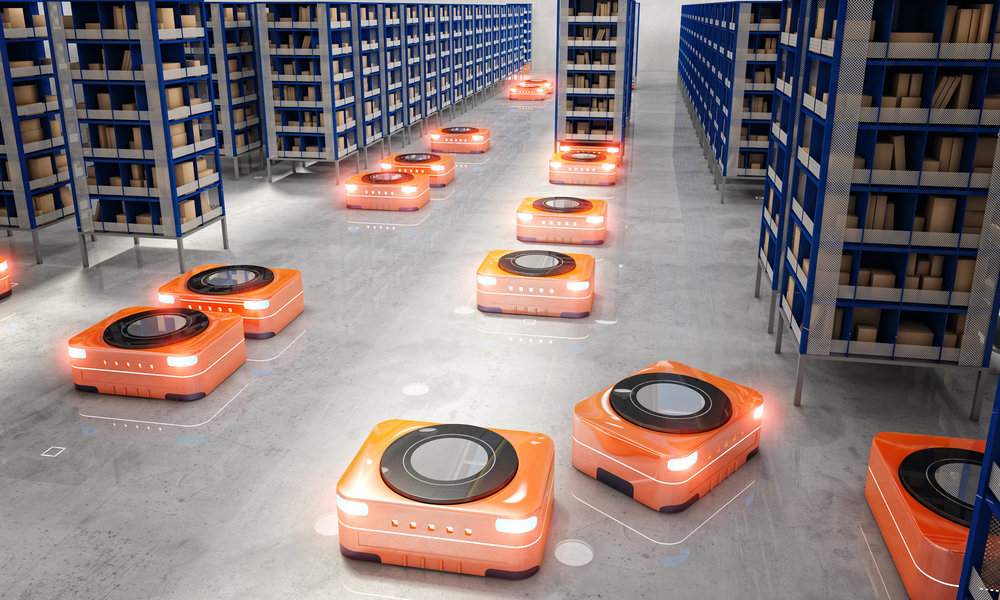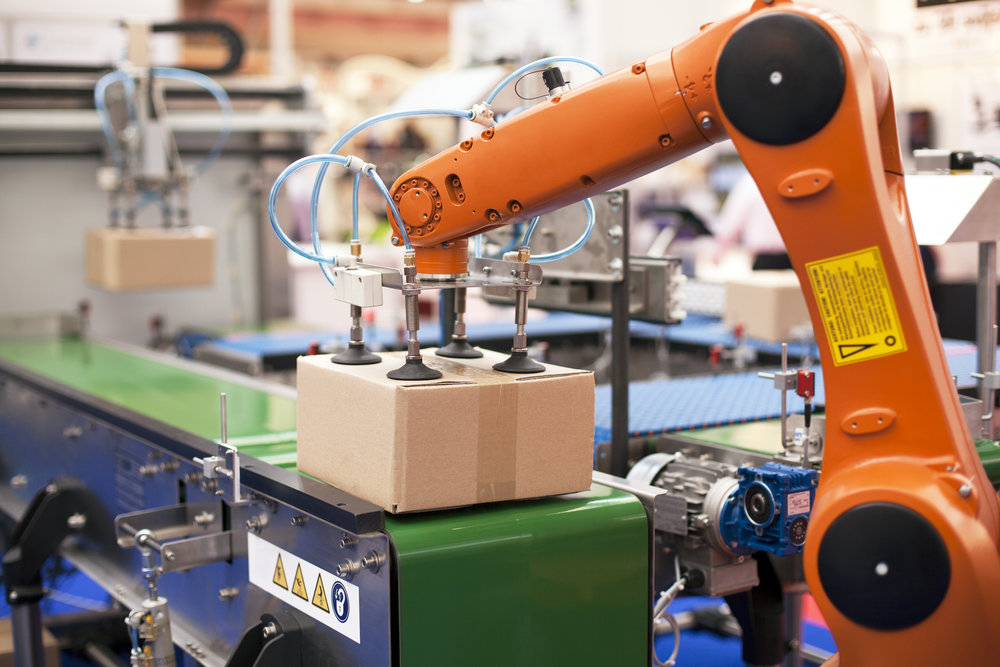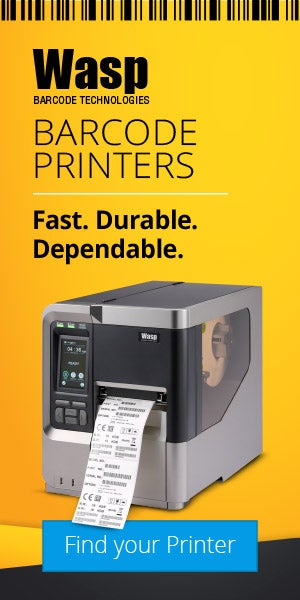Wasp Barcode Technologies: The Barcode Solution People
How Robots Are Changing the Automatic Data Capture Market
 If there’s one technology trend we can say is sweeping almost every part of modern life—including ecommerce, warehousing, supply chain management and business in general—it’s quite simple: robots. Whether sitting on your desk in the form of Amazon’s Alexa or rushing across warehouse floors to unpack pallets, robots and other forms of automation are the next big thing.
As for the reason why robots are so important to businesses everywhere: Any company that wants to take the next steps towards increased efficiency and speed—think same-day deliveries by e-tailers rather than two-day shipping—needs to understand the ever-increasing capabilities that robotics bring to the table.
Take Honeywell, for example. The multinational conglomerate has a hand in all kinds of businesses, from aerospace to performance materials. One of its business units is automation and control systems, including scanning and mobility solutions like mobile computers and barcode scanners.
If there’s one technology trend we can say is sweeping almost every part of modern life—including ecommerce, warehousing, supply chain management and business in general—it’s quite simple: robots. Whether sitting on your desk in the form of Amazon’s Alexa or rushing across warehouse floors to unpack pallets, robots and other forms of automation are the next big thing.
As for the reason why robots are so important to businesses everywhere: Any company that wants to take the next steps towards increased efficiency and speed—think same-day deliveries by e-tailers rather than two-day shipping—needs to understand the ever-increasing capabilities that robotics bring to the table.
Take Honeywell, for example. The multinational conglomerate has a hand in all kinds of businesses, from aerospace to performance materials. One of its business units is automation and control systems, including scanning and mobility solutions like mobile computers and barcode scanners.
[su_divider top="no" size="2"]
[su_divider top="no" size="2"]
And that space is primed to continue growing. According to a report by Technavio, the “global automatic data capture market”—which includes barcode scanners, rugged mobile computers, speech identification devices and other instruments that identify objects, obtain information on them and feed them into a database without further human involvement—is expected to grow to $9 billion in revenue by 2019.
Handheld scanners in particular are preferred in transportation, logistics and manufacturing, thanks to their portability and ease of use. What’s driving the explosion in this space? Simple: The incredible growth of ecommerce.
We all know how Amazon and other e-tailers have taken over retail, not just economically but in popular culture. Many shoppers’ first stop is Amazon, or the online versions of Wal-Mart and Target. That’s how retail ecommerce sales grew to $1.55 trillion dollars in 2015, and is predicted to grow to $3.4 trillion by 2019.
Those are, obviously, very high numbers. Skyrocketing demand for making retail more cost-efficient and generally faster means that companies involved in supply chain management will need to do some serious investing in the next few years to keep up. That’s why, though barcode scanners and other devices of their ilk are slated to continue growing, companies like Honeywell are looking to robots to help meet demand.
To that end, Honeywell recently acquired Intelligrated, a robotics hardware, control software and deep integration experience company, to help them take the next step in this field.
From a Forbes article on the acquisition:
...Honeywell now offers mechanized material handling product lines under Intelligrated’s Alvey brand, which focuses on palletizing and de-palletizing: packing cases onto pallets for outbound shipping and unpacking arriving pallets for warehouse storage. Alvey focused in recent years on optimizing the handling of goods that bear minimal secondary packaging.
The same article says that 40 percent of retailers “will buy advanced robotics or autonomous vehicles for their warehouses in the next three years.” So this isn’t just a bold experiment by one company: It’s quickly going to become a norm in warehousing.
In fact, Intelligrated already worked with high-volume retailers like Amazon and Walgreens and shippers like UPS and the U.S. Postal Service. Intelligrated’s competitors are also being purchased by bigger fish: Dematic was purchased by Kion Group; Kuka is being acquired by Midea. Expect this trend to continue in the coming years.
As previously discussed, robots in this space aren’t usurpers as much as they assistants at this point. When it comes to robots and drones, many warehouses aren’t currently equipped or outfitted to allow their automated machines to do all the work, and the process of upgrading or buying a new warehouse space and designing it with robots in mind is an enormous investment.
So when it comes to robots, smaller upfront investments is likely the way many businesses will go—doing trial runs with robots in one area, incorporating their work into the larger supply chain management system.
[Tweet "So when it comes to robots, smaller upfront investments is likely the way many businesses will go."]
And when it comes to palletizing or de-palletizing, robots are becoming increasingly more adept. Kinema systems, a California-based startup, recently developed a robot that can break down pallets of boxes regardless of the box size or shape or how boxes are packed together. This is a breakthrough in the space—a fairly routine task that humans can perform can now be completed by robots, which work ceaselessly and tirelessly.
 According to the company, the robots can essentially teach themselves how to pick up different boxes, and adjust for changing environmental conditions such as lights or how to deal with labels and packing tape. Kinema CEO Sachin Chitta says “As it picks things up, it builds a model of each box. And in the future, it can use that model to speed things up.”
There’s the money word: speed. Robots, drones and other automated devices like barcode scanners help companies move at the increasing speed of ecommerce. It simply isn’t enough to do manual hand counts or use spreadsheets any more—a surprising number of small and medium-sized business still rely on manual processes to keep track of inventory—when companies will be competing with large e-tailers that will promise, and deliver, orders to customers in a matter of hours, not days. Their ability to effectively do so (which involves knowing exactly how much inventory is on-hand, how much will be needed to meet future demand, and to update the company database on the fly to account for returns, rush orders and other obstacles) will be powered by this new wave of automation.
According to the company, the robots can essentially teach themselves how to pick up different boxes, and adjust for changing environmental conditions such as lights or how to deal with labels and packing tape. Kinema CEO Sachin Chitta says “As it picks things up, it builds a model of each box. And in the future, it can use that model to speed things up.”
There’s the money word: speed. Robots, drones and other automated devices like barcode scanners help companies move at the increasing speed of ecommerce. It simply isn’t enough to do manual hand counts or use spreadsheets any more—a surprising number of small and medium-sized business still rely on manual processes to keep track of inventory—when companies will be competing with large e-tailers that will promise, and deliver, orders to customers in a matter of hours, not days. Their ability to effectively do so (which involves knowing exactly how much inventory is on-hand, how much will be needed to meet future demand, and to update the company database on the fly to account for returns, rush orders and other obstacles) will be powered by this new wave of automation.
[Tweet "Robots, drones and other automated devices like barcode scanners help companies move at the increasing speed of ecommerce."]
What is the future of robots and warehousing, or robots and supply chain management in general? There are lots of predictions out there, but the truth is, the future is a little unclear. Who would have thought at the beginning of the century that there would already be talk of robots in the workplace, whether breaking down our pallets, delivering our orders or even knitting us sweaters in-store, on-demand?
We do know that major retail players are gearing up for supply chain and inventory management systems powered by automated machines, be they tiny, insect-like drones or speedy robot workers that can move shipments from pallets to warehouse shelves and back again. Keep an eye on major players in the space that work with barcode scanners, mobile computers, robotics and more to see what investments they continue to make for a glimpse into the not-so-distant future.




